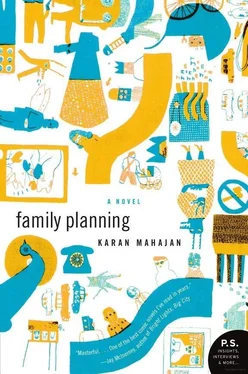Then news came from Dalhousie that Sangita’s mother had passed away.
Sangita was devastated. Lacking love from Rakesh and Arjun — the two people who could most have validated her existence because they actually owed her nothing by blood — she had secretly started obsessing about inviting her mother to marvel at her life. She wanted to show her controlling Mummy what she’d become. Her whole life had been a performance for her mother, and now her mother had skipped out on the show.
Sangita’s domestic routine became utterly pointless. She took pleasure in nothing. She spent days at a stretch watching TV. She saw her brood for what it was: a messy constituency that supported Rakesh endlessly. She became obsessed with the hit series titled The Vengeful Daughter-in-Law . She stopped gorging herself on mangoes, as was her habit during a pregnancy. She submitted to sex in the nursery with a dreary uninterested look on her face; even the risk of being caught didn’t turn her on.
And when Rakesh scolded her about Arjun’s poor marks in school, she simply said, “Please tell him.”
“Tell who?” said Rakesh, smacking a curtain. “Tell the servant to make tea? Tell the postman to get post? Tell the baby to drink milk? Sangita, you are always using pronouns. Tell what? Tell who?”
“Please tell him,” she said. “Tell Arjun about me. About his real mother.”
“No,” he said.
Finally, Rakesh was so frustrated that he took her to the doctor.
The doctor did what he always did. He pleaded that she not have this child, Sangita’s twelfth. The risk of Down syndrome increased with every child, and there was a good chance this baby would be somehow damaged, malformed.
Rakesh said to her in the car, “We can stop this one if you want. I am sorry.”
“No,” she said.
“You’re very brave,” he said, with a sigh.
Yes. She had no shortage of bravery.
Was this why she felt no shame when Arjun walked in on them? Was this why she’d practically let it happen?
They were on the floor of the nursery, late at night. All the children were asleep, and she could hear all the creaky sounds of the evening as Rakesh lay on top of her and undid the strings of her pajamas, as he moved his hand all over her stomach and said, “It’s okay, Sangita, it’s okay,” she could hear everything — the start-stop almost-fake screaming of the babies, newborn larynxes vibrating in newborn bodies, the way the cots always swayed at once, the fan overhead screwing itself off the ceiling, even the soft plop of his erect penis against his stomach after he slipped off his own pants. But this particular night there was another sound: the creaking of a door, footsteps. She could have warned Rakesh, she could have quickly forced him to roll off, but she didn’t, why didn’t she?
He couldn’t hear anything except his own panting.
Then Arjun opened the door and let out a brief exclamation. It was too late. Rakesh rolled off her abruptly, ashamed. He glared into the space above Arjun’s head. Sangita recognized that look instantly — she remembered it from the first night of her marriage, the way his face throbbed uncertainly between pity and revenge, as if there was no difference between the two. She knew that something was about to give for good, just as she had known then. She knew something was coming to an end, and yet she could not get bring herself to panic. Arjun had seen everything, he had retreated into the hollows of the house, and Rakesh was still glaring at the doorway, frozen over her, on his four limbs, head twisted backward terribly, like an animal. But didn’t it have to happen sometime? Hadn’t she told him so many times, for months, we are taking a risk, we can’t keep doing this, someone will find out?
Yes, a part of her wished that she could have shared her husband’s shame, that she could have gathered him up to her bosom and soothed him like a child. But right then, all she could feel was relief. As she saw the exasperation bloom on Rakesh’s face, all she could think was Yes, finally, he has found someone else to blame .
CHAPTER 12. A FLYOVER, FINALLY
IT WAS SIX FORTY-FIVE IN THE EVENING when the four boys began to descend the flyover.
Earlier, they had left the GK Barista and discussed the possibility of finding a new practice space. They cruised along the same route Arjun had traversed in the school bus; the unreeling landscape reminded him of Aarti, he could string together the succulent sentences of their conversation with every gnarled tree, the traffic lights that flickered neurotically between red and yellow, the large tracts of Chinese restaurants hunched together under large dragon-toting billboards, and when they passed the mysterious, incomplete Godse Nagar Flyover, Arjun asked Ravi to slow down. The two slopes of the flyover ended in midair, never touching. A number of daunting construction machines — grinders, lifters, mixers — dozed under the flyover. The car halted at the red light, and Arjun rolled down his window. “Here,” he shouted.
Ravi killed the car skeptically. The in-progress Godse Nagar Flyover — particularly its exposed underside — was hardly a grand specimen. The structure was held aloft by a series of twin columns and arches shaped like upturned boats. Ugly beards of dust hung from the ceiling, and the entire complex — the orange fence, the small buzzcut palms, the crumbling floor tiles, the scabs of B-movie posters stuck on the columns — was burnished with a thin layer of soot that glowed in the high beams of the capsizing sun. The setting was serene: two beggars lay about on gray mats, a child nursed at a young woman’s breast, an old man stared angrily from a tent, perhaps contemplating the rivulets of water pronging out through the dust and despairing that the daytime sprinkler had been shut off. Barring the noise — the thousands of ballooned souls bursting out of their vehicles with crazed honks — this could have been the reddened surface of Mars.
Arjun cleared the two rusty MEN AT WORK signs at the base of the flyover. He wiped his hands on his jeans. Then he began walking slowly to the very top of the flyover, Ravi breathing very loudly as he followed, now extremely conscious of the bony pedals and shifts that kept one’s body earthbound, Arjun urging him to keep going, their feet gripping the fresh road with a sense of desperation. There were no protective barriers on the side. In a matter of minutes, they were at the top, fifty feet in the air, the road giving way to long rods of steel ahead of them, the lights illuminating a patch of nothingness that hung between the two ends of the incomplete road. Ravi held a girder and gasped. Anurag whooped from behind them.
Arjun tread softly on the fresh tar. “My father built this,” he whispered to Ravi.
“You’re crazy,” said Ravi.
To demonstrate that Ravi was, in fact, correct in his diagnosis, Arjun walked to the very end of the road and stood there, a single inch of road separating the tips of his shoes from total darkness. Then he kicked, he kicked furiously, he didn’t know why, he couldn’t possibly, and there started a rain of rubble from the parapet and Arjun drew back fearfully on his heels, the April air whispering around him with an unexpected coolness, and there was a singular upthrust from the cavity, and he saw it then: a flock of pigeons nesting at the very end of the iron rods had been shoved into sudden flight, the birds were nosediving into the muddy hollow below before floating out from under the flyover, all dust and wings. The rubble had wings! He turned back to the band and faced the boys. They stared back. This was the first time they had viewed him with a measure of awe (it wouldn’t last long).
Читать дальше












